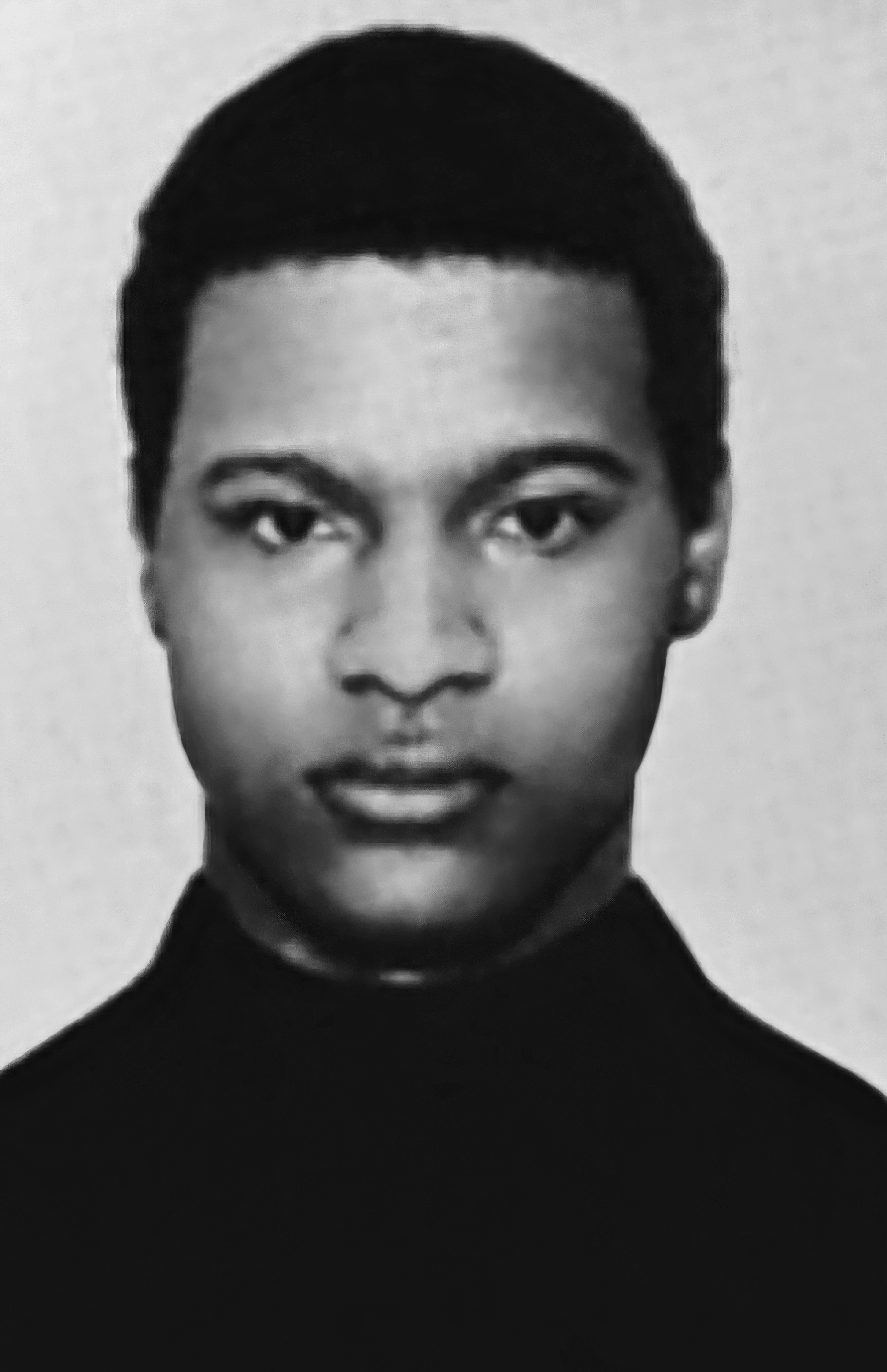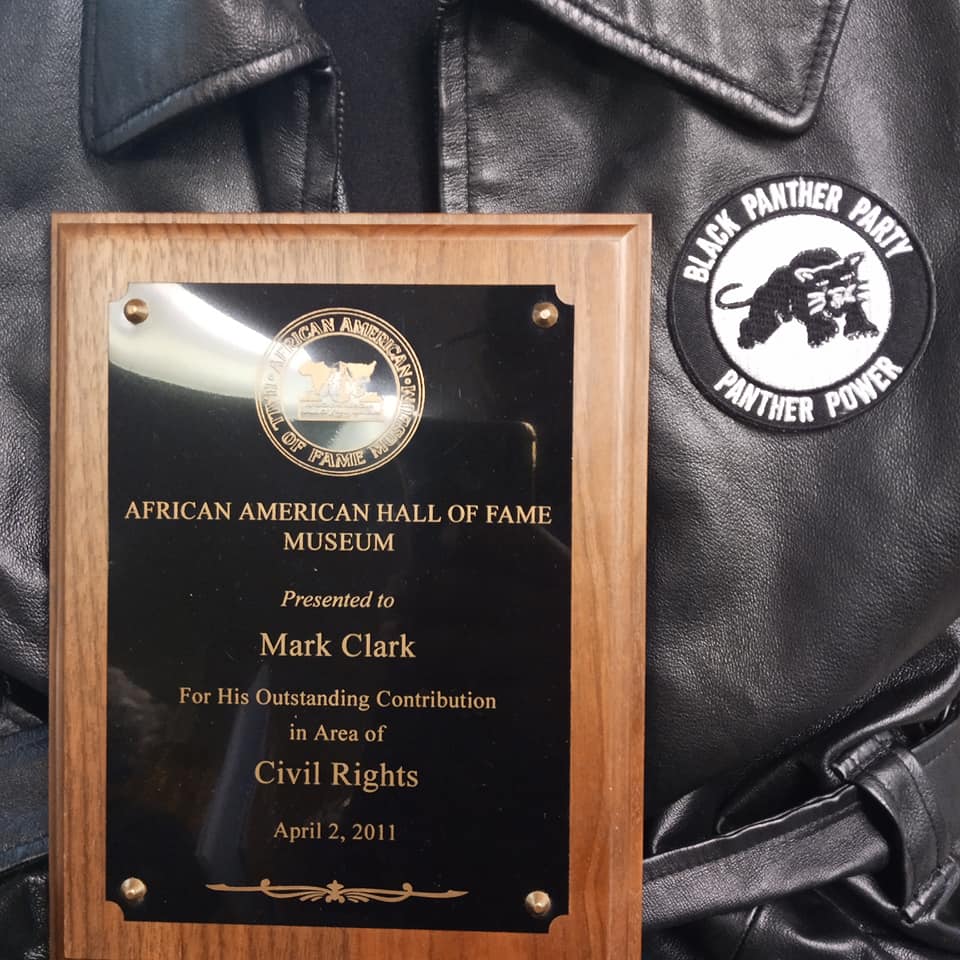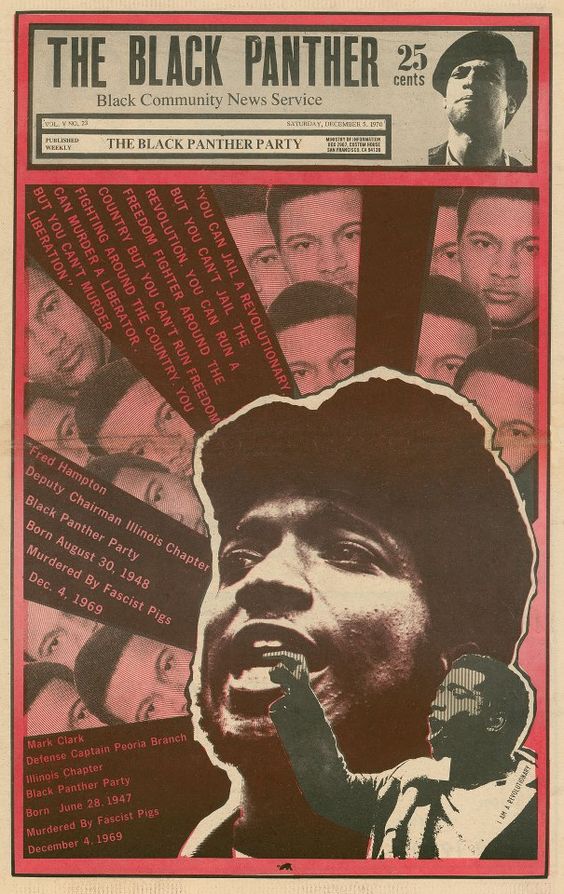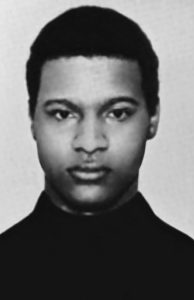
Mark Clark (June 28, 1947 – December 4, 1969) was an American activist and the Defense Captain of the Peoria Black Panther Party. He was killed along with Fred Hampton, the Chairman of the Chicago Black Panther Party during a Chicago predawn police raid on December 4, 1969.
Mark was born on June 28, 1947, in Peoria, Illinois, to Elder William Clark and Fannie Bardley Clark. He became active in the National Association for the Advancement of Colored People (NAACP) at an early age and joined in demonstrating against discrimination in employment, housing, and education. According to John Gwynn, former President of state and local chapters of the NAACP, Clark and his brothers played a role in helping keep other teenagers in line. “He could call for order when older persons or adults could not,” Gwynn said of Clark in a December 1969 interview with the Chicago Tribune. In that same Chicago Tribune article, family members are quoted as saying Clark enjoyed reading and art, and was good at drawing portraits. He attended Manual High School and Illinois Central College in Peoria.
Black Panther Party
After reading their literature and the Ten Point Program, Mark Clark joined the Black Panther Party and later decided to organize a local Peoria chapter. He went from church to church in an effort to find a building to house a free breakfast program. He was eventually successful when Pastor Blaine Ramsey agreed to allow a free breakfast program. Church members later voted against continuing the breakfast program because of concerns of government monitoring of the Black Panther Party.
THE FREE BREAKFAST PROGRAM IN PEORIA
Mark Clark became the Peoria, Illinois Defense Captain of the Black Panther Party primarily because he was able to recruit comrades and organize the first chapter in Peoria. After organizing a local Peoria Black Panther Chapter, Mark went from church to church in an effort to find a building to house a free breakfast program. He was eventually successful when Pastor Blaine Ramsey agreed to allow a free breakfast program at his church. But after a short while, church members later voted against continuing the breakfast program because of fears of government monitoring of the Black Panther Party.
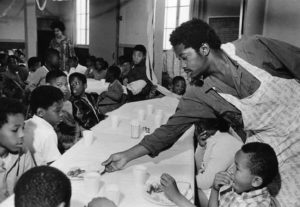
Death
The activities of the Black Panthers in Chicago came to the attention of J.Edgar Hoover and the FBI. Utilizing a Counter Intelligence Program called COINTELPRO, Hoover described the Panthers as”the greatest threat to the internal security of the country” and urged the Chicago police to launch an all-out assault on the organization. In 1969 the Panther party headquarters on West Monroe Street was raided three times and over 100 members were arrested.
Some family members and friends say Mark Clark knew he would be murdered in Chicago. In the predawn hours of December 4, 1969, Chicago Police stormed into the apartment of BPP State Chairman Fred Hampton at 2337 West Monroe Street, killing both Mark Clark (age 22 and Fred Hampton (age 21), and causing serious bodily harm to Verlina Brewer, Ronald “Doc” Satchel, Blair Anderson, and Brenda Harris.
Hampton and Deborah Johnson, who was eight-and-a-half months pregnant with their child, were sleeping in the south bedroom. Satchel, Anderson, and Brewer were asleep in the north bedroom. Harris and Louis Truelock were sleeping on a bed by the south wall of the living room, and Harold Bell slept on a mattress on the floor in the middle of the room. Clark, sitting in the front room of the apartment with a shotgun in his lap, was on security duty.
The first shot hit Clark in the heart. He died instantly, and his gun went off as he fell, according to Harris, who watched from the bed in the corner.
The single round was later determined to be caused by a reflexive death convulsion after the raiding team shot him. This was the only shot the Panthers fired. A federal grand jury determined that the police fired between 82 and 99 shots, including into bedrooms, while most of the occupants lay sleeping
Inquest
Shortly afterwards, Cook County coroner Andrew Toman began forming a special six member coroner’s jury to hold an inquest into the deaths of Clark and Hampton] On December 23, Toman announced four additions to the jury which included two African-American men: physician Theodore K. Lawless and attorney Julian B. Wilkins, the son of J. Ernest Wilkins, Sr. He stated the four were selected from a group of candidates submitted to his office by groups and individuals representing both Chicago’s black and white communities Civil rights leaders and spokesmen for the black community were reported to have been disappointed with the selection An official with the Chicago Urban League said: “I would have had more confidence in the jury if one of them had been a black man who has a rapport with the young and the grass roots in the community. Gus Savage said that such a man to whom the community could relate need not be black] The jury eventually included a third black man who was a member of the first coroner’s jury sworn in on December 4.
The blue-ribbon panel convened for the inquest on January 6, 1970 and on January 21 ruled the deaths of Clark and Hampton to be justifiable homicide. The jury qualified their verdict on the death of Hampton as “based solely and exclusively on the evidence presented to this inquisition” police and expert witness provided the only testimony during the inquest Jury foreman James T. Hicks stated that they could not consider the charges of the Black Panthers in the apartment who stated that the police entered the apartment shooting; those who survived the raid were reported to have refused to testify during the inquest because they faced criminal charges of attempted murder and aggravated assault during the raid Attorney’s for the Clark and Hampton families did not introduce any witnesses during the proceedings, but described the inquest as “a well-rehearsed theatrical performance designed to vindicate the police officers”. State’s Attorney Edward Hanrahan said the verdict was recognition “of the truthfulness of our police officers’ account of the events”
Civil rights lawsuit
In 1970, a $47.7 million lawsuit as filed on behalf of the survivors and the relatives of Clark and Hampton stating that the civil rights of the Black Panther members were violated.Twenty-eight defendants were named, including Hanrahan as well as the City of Chicago, Cook County, and federal governments The following trial lasted 18 months and was reported to have been the longest federal trial up to that time After its conclusion in 1977, Judge Joseph Sam Perry of United States District Court for the Northern District of Illinois dismissed the suit against 21 of the defendants prior to jury deliberations Perry dismissed the suit against the remaining defendants after jurors deadlocked In 1979, the United States Court of Appeals for the Seventh Circuit in Chicago stated that the government had withheld relevant documents thereby obstructing the judicial process Reinstating the case against 24 of the defendants, the Court of Appeals ordered a new trial. The Supreme Court of the United States heard an appeal but voted 5-3 in 1980 to return the case to the District Court for a new trial.
In 1982, the City of Chicago, Cook County, and the federal government agreed to a settlement in which each would pay $616,333 to a group of nine plaintiffs, including the mothers of Clark and Hampton. The $1.85 million settlement was believed to be the largest ever in a civil rights case.
https://en.wikipedia.org/wiki/Mark_Clark_(activist)
_______________________________________
The Clark family would like to state emphatically that the assassinations of Chairman Fred Hampton and Defense Captain Mark Clark of the Black Panther Party (BPP) was not by accident. Given the information we now know regarding COINTELPRO, any reasonable person would conclude that it was a premeditated assassination on these two leaders lives. Ballistics showed that 99 shots were fired by the Chicago police, and only one shot was fired by the Panthers which was an involuntary reflexive shot that went off from Mark’s gun after he had been shot in the heart. It was not a coincidence that the ones killed in the raid just happen to be the two Black Panther leaders. Fred Hampton was the BPP leader from Chicago while Mark Clark was the BPP leader from Peoria, Illinois.
Whether you liked the Black Panther Party or not, whether you agreed with their rhetoric or not, murder is murder and then to lie to cover it up is just as abhorrent.
____________________________________________________________________________________________________
TRIBUTES HONORING MARK CLARK
Before we give tribute: I would personally like to acknowledge the tireless work that my dear sister Kay Clark did before she passed away in June of 2011. She was the administrator of our family website titled, Remember Mark Clark.com. Unfortunately, that information and over 500 tributes were lost when that website went down. Also, I want to acknowledge my brother James Clark, George Clark, and my sister Elner for keeping Mark’s legacy alive with the Mark Clark Memorial Foundation. Last but certainly not least, I want to acknowledge my dear brother Joseph who joined the BPP along with me in 1969 and who sold numerous BPP Newspapers in both Peoria, Illinois and Flint, Michigan. May Mark, Joseph, Kay, James, George, along with all of my dearly departed relatives R.I. P.
To maintain Mark’s legacy, I have created this newer website created in 2017 to honor the memory of our brother Mark Clark and his comrade Fred Hampton. Anyone wishing to add a tribute may do so by contacting me in the contact section of this website. Thank you.
Administrator, Gloria Jackson (Clark)
__________________________________________________________
TRIBUTES TO MARK CLARK
__________________________________________________________
POSTED by Gloria on Wednesday, June 28, 2006 in Remember Mark Clark.com.
By Gloria Jackson (Clark)
MARK CLARK, MY BROTHER AND FRIEND
The friendship that my brother Mark and I developed was primarily due to the close proximity of our age. Since Mark was about 3 years older than me we interacted with each other often. Over the course of our sister/brother relationship we became very close experiencing many good times. He influenced me in many positive ways and taught me a lot about life and people. There were 5 very distinct events that I remember most clearly about my brother Mark: Here are just a few of those defining moments that would change my life forever. The first event was when Mark made me fight a boy.
We attended Lincoln Elementary School in Peoria, Illinois. One day my younger brother Joseph came home with a bloody nose and said a 4th grader had jumped him. When Mark heard about it, he came to me and said, “Gloria, you are going to fight the boy who jumped on Joseph.” I was in the fourth grade while Joe was only in the third and Mark always believed in a fair fight. Mark had done some amateur boxing, so he showed me a few moves and told me exactly what to do. I really didn’t want to do it because the boy hadn’t done anything to me; but after a short debate, Mark finally said, “you can either fight the boy or you can fight me.” Needless to say, I chose the boy (and won).
One of the things that always impressed me about Mark was the love that he showed towards his entire family. One such event happened to me after I became a young teenager. Since my father was a very strict Pastor of a prominent church, the only way we could go anywhere was to sneak out and (pray) we didn’t get caught. Well, when Mark learned that I had been sneaking out and socializing with certain girls, he came looking for me. When he found me, he pulled me to the side and told me to go home. He explained to me that the girls that I was hanging around had a bad reputation and if I stayed, I would get a bad name too. Mark took the time to prevent me from making a mistake that he knew I might later regret. Mark was a true big brother.
What I loved most about Mark was that he always stood up for the underdog. He had an innate sense of fairness and if he thought something was not right, he would immediately intervene and make his objections known. By the time Mark had joined the Black Panther Party (BPP), he had already influenced my life greatly and I knew first hand the character and principals that he stood upon. So shortly after Mark established the Black Panther Chapter in Peoria, Illinois, he came to me and Joseph and solicited us to join.
Looking back on everything now, I can’t help but marvel at how young we all were. Mark had just turned 22, I had just turned 19, and Joseph was turning 18. I remember that day clearly because Mark said something so profound that I have never forgotten it. Mark approached us and said, “There are many that will talk about the injustice in this country; but only a few will do something about it. Which one are you?” That was the day that Joseph and I joined the Black Panther Party.
After joining the BPP, the first thing we had to do was learn the 10 point program. The BPP had strict rules that had to be followed. It was serious business and they let you know that from day one of our first meeting. We also had to sell BPP newspapers daily. We would stand on the corners and stop people as they came by; asking them if they wanted to learn what was going on against Blacks. To my surprise, we sold hundreds of papers daily because there was so much injustice going on at that time. (1969)
One of my most memorable experiences while in the BPP was when the Peoria Chapter car pooled and drove to Chicago 5 to 6 cars deep. There were about 30 of us in the Peoria group, but when we got to Chicago, it blew us away to see hundreds of comrades there. We met up at a nearby school yard and practiced marching military style. It was such a beautiful thing to see: Black men and Black women all united in unity dressed in black with afros and fist raised high in the air, all chanting—Power to the People! We had only one purpose in mind—to fight against the oppression of all people. I remember being so proud and excited just to be a part of it.
The last time I saw my brother Mark alive was around the end of November of 1969 during a trip to Flint, Michigan with my mother and my oldest brother William. William was driving and we dropped Mark off in Chicago on our way to Flint. Mark was sitting in the back seat along with me and my one year old son Mike. When we got to Chicago, Mark got out of the car and grabbed his bags from the trunk. Then he turned to us and said, “I might not see y’all again, but don’t worry about me.” We all tried to persuade Mark to come to Flint instead of staying in Chicago: We pleaded with him for a good while. Mark told us that he had committed himself to the principals that he believed in and this was something that he had to do. As we drove off, my mother let out a gut wrenching moan and she began leading us all in prayer. We prayed for a long time. Then we didn’t talk much after that. We were all very solemn and sad because we felt a sense of doom.
Of all the events that would change my life forever, none of them could compare to the devastation that I felt when we got the news that Mark had been killed. The moment my mother got the call, we immediately knew that Mark had been murdered, even though we were all still in shock and disbelief. That phone call had confirmed our worse fears. On December 4, 1969, one by one, each family member broke down screaming and crying uncontrollably: One by one we had to console each other, especially our Mom. We wanted to know what exactly had happened. We wanted to know why he was murdered. Our only consolation on that cold wintry day was that we vowed to find out the truth.
Mark Clark and Fred Hampton were exceptional people because they were willing to die for what they believed in. Mark’s innate sense of fairness, his compassion, and his thoughtfulness were the qualities that I knew about him. He stood up for those that could not or would not stand up for themselves. He was a dedicated leader for civil rights and a great humanitarian. So when Mark died, it was impossible for me to focus on the facts surrounding his tragic murder: I could only focus on the fact that my dear brother and friend was dead…
By Gloria Jackson (Clark)
___________________________________________________________
